Thousands of acres of land are being burned by swift-moving bushfires that are causing evacuations throughout southeast Australia.
Thousands of acres of national park burned Tuesday, forcing a farming community to evacuate as firefighters frantically attempted to put out a series of rapidly spreading fires in southeast Australia.
In the Grampians National Park, a wooded mountain area located roughly 300 kilometers (186 miles) west of Melbourne, the state capital of Victoria, lightning strikes on Monday night started multiple fires.
According to emergency services, a different fast-moving fire in the state’s west’s Little Desert National Park has burned an area nearly as large as Singapore, destroying nearly 65,000 hectares (160,000 acres) in less than 24 hours.
Rural Dimboola had to be evacuated due to that fire before Tuesday afternoon’s hazard levels were lowered.
Rick Nugent, the commissioner of emergency management, told reporters, “I’m incredibly thankful that no lives have been lost and we have no reports of injury either.”
Forest Fire Management Victoria’s Chris Hardman issued a warning, stating that the likelihood of the fires spreading is increasing due to the weather over the next few days.
“Right now firefighters are planning to do everything in their powers to protect communities,” he stated.
“The dome over Victoria is hot.”
Bureau of Meteorology forecaster Kevin Parkyn said blistering heatwave conditions would settle over areas of Victoria on Saturday, raising fire hazards.
“The key takeaway from the next seven to ten days is that Victoria will be covered by a heat dome.
“Don’t be shocked if heatwave conditions spread throughout the state over the weekend and develop worse over the course of the next week.
“The landscape is dry, and if we continue to see these hot conditions, it will continue to dry the landscape out further.”
Researchers have shown that warmer temperatures are contributing to more severe natural disasters around Australia.
Since the 1950s, scientists have found that intense fire weather has significantly increased nationwide.
The historic “Black Summer” bushfires of 2019–2020 destroyed large areas of forest, engulfed major towns in dense smoke, and claimed 33 human lives and millions of animals.






